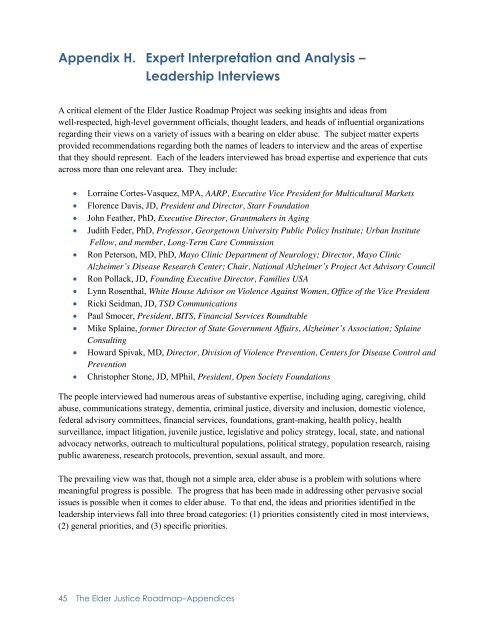The Elder Justice Roadmap
2gJRXoo
2gJRXoo
You also want an ePaper? Increase the reach of your titles
YUMPU automatically turns print PDFs into web optimized ePapers that Google loves.
Appendix H. Expert Interpretation and Analysis –<br />
Leadership Interviews<br />
A critical element of the <strong>Elder</strong> <strong>Justice</strong> <strong>Roadmap</strong> Project was seeking insights and ideas from<br />
well-respected, high-level government officials, thought leaders, and heads of influential organizations<br />
regarding their views on a variety of issues with a bearing on elder abuse. <strong>The</strong> subject matter experts<br />
provided recommendations regarding both the names of leaders to interview and the areas of expertise<br />
that they should represent. Each of the leaders interviewed has broad expertise and experience that cuts<br />
across more than one relevant area. <strong>The</strong>y include:<br />
<br />
<br />
<br />
<br />
<br />
<br />
<br />
<br />
<br />
<br />
<br />
<br />
Lorraine Cortes-Vasquez, MPA, AARP, Executive Vice President for Multicultural Markets<br />
Florence Davis, JD, President and Director, Starr Foundation<br />
John Feather, PhD, Executive Director, Grantmakers in Aging<br />
Judith Feder, PhD, Professor, Georgetown University Public Policy Institute; Urban Institute<br />
Fellow, and member, Long-Term Care Commission<br />
Ron Peterson, MD, PhD, Mayo Clinic Department of Neurology; Director, Mayo Clinic<br />
Alzheimer’s Disease Research Center; Chair, National Alzheimer’s Project Act Advisory Council<br />
Ron Pollack, JD, Founding Executive Director, Families USA<br />
Lynn Rosenthal, White House Advisor on Violence Against Women, Office of the Vice President<br />
Ricki Seidman, JD, TSD Communications<br />
Paul Smocer, President, BITS, Financial Services Roundtable<br />
Mike Splaine, former Director of State Government Affairs, Alzheimer’s Association; Splaine<br />
Consulting<br />
Howard Spivak, MD, Director, Division of Violence Prevention, Centers for Disease Control and<br />
Prevention<br />
Christopher Stone, JD, MPhil, President, Open Society Foundations<br />
<strong>The</strong> people interviewed had numerous areas of substantive expertise, including aging, caregiving, child<br />
abuse, communications strategy, dementia, criminal justice, diversity and inclusion, domestic violence,<br />
federal advisory committees, financial services, foundations, grant-making, health policy, health<br />
surveillance, impact litigation, juvenile justice, legislative and policy strategy, local, state, and national<br />
advocacy networks, outreach to multicultural populations, political strategy, population research, raising<br />
public awareness, research protocols, prevention, sexual assault, and more.<br />
<strong>The</strong> prevailing view was that, though not a simple area, elder abuse is a problem with solutions where<br />
meaningful progress is possible. <strong>The</strong> progress that has been made in addressing other pervasive social<br />
issues is possible when it comes to elder abuse. To that end, the ideas and priorities identified in the<br />
leadership interviews fall into three broad categories: (1) priorities consistently cited in most interviews,<br />
(2) general priorities, and (3) specific priorities.<br />
45 <strong>The</strong> <strong>Elder</strong> <strong>Justice</strong> <strong>Roadmap</strong>–Appendices


